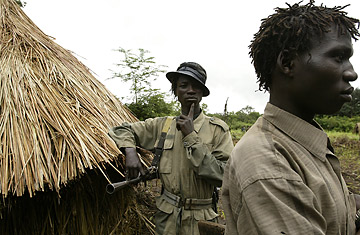
Armed Lord's Resistance Army soldiers on patrol in Uganda, 2006.
Dorine Akuma does not remember the exact year she came to Unyama Camp in northern Uganda, but she remembers the reason why. Sitting on the floor of her dimly lit stone hut as chickens and small children wander outside the door, Akuma describes the day when rebels of the Lord's Resistance Army (LRA) came to her home to murder two of her sons and abduct her daughter to be a sex slave. Since then, the years have been a blur to the 60-year-old widow. And many who have suffered like her through the 20-year civil war just want to go home. Even if the cost is justice.
The price they have been paying has been high enough. Tens of thousands of innocent civilians, primarily from the Acholi ethnic group, have died as a result of the brutal rebellion waged by the LRA in the north of this small east African nation; 1.7 million were uprooted to camps for displaced persons. The rebels have spread terror throughout northern Uganda by massacring and disfiguring civilians, regularly cutting off the noses and ears, cheeks and lips and eyelids of their victims. The group has also abducted an estimated 25,000 children to serve as soldiers, porters and sex slaves. In March of last year, the violent death rate in northern Uganda was three times higher than in Iraq, according to an NGO coalition report.
"They should be punished for what they did," Akuma says. But punishment may be a fungible term. For Akuma, like other suffering Acholi people, wants a quiet conclusion to the rebellion so that she and thousands of other northern Ugandans who took refuge in filthy, desolate camps for displaced people during the 20-year war, can return home. Says Akuma, "[the rebels] should also come back peacefully so that we can finally leave these camps." Many of the displaced believe that their tormentors should be put through the traditional justice of the Acholi people — a ritual called mato oput that requires a murderer to face relatives of the victim and admit his crime, leading to both parties drinking a bitter brew as an act of reconciliation.
Unsurprisingly, human rights groups say the process is not harsh enough punishment. For the victims, the reasoning, however, is not just based on tradition but practicality. Agnes Adokorach, a 25-year-old relegated to the camps when her brothers were abducted, thinks it is of "no use" to punish the rebels, many of whom are relatives of the displaced civilians. Her neighbors say that punishment will only worsen the situation when the LRA disbands and its members return to live side-by-side with their victims.
The accused rebels, of course, are all for mato oput. LRA leader Joseph Kony was indicted, along with three other commanders, by the Hague-based International Criminal Court (ICC) for war crimes and crimes against humanity. Kony and his co-defendants say that they want the government to scrap the multiple-count indictment. If not, the rebels warn that they will not sign a peace agreement that is being hammered out in Juba, in southern Sudan, between the Ugandan government and the LRA.
The Ugandan government may indeed be moving to shield the LRA from the international court. It recently announced that it will set up a special tribunal to handle internally the war crimes of the LRA. Uganda's Foreign Affairs Minister Oryem Okello says that the tribunal will be comparable to that used in neighboring Rwanda after the 1994 genocide. (To complicate matters, Uganda's displaced have also accused government soldiers of atrocities during their time in the camps. But Uganda's proposed national tribunal will not handle cases of abuse by the army. Instead, the soldiers will be tried by preexisting courts-martial.)
"We need a national truth and reconciliation process," says Norbert Mao, chairman of Gulu district, one of the Ugandan towns hardest hit by the conflict. In Gulu, over 70% of displaced people still have not been able to leave the camps due to fears of safety and lack of land — though many are in settlements within 20 km of their home. "It's a situation where many feel that they are in limbo... and there are mixed feelings about whether the LRA leadership should be tried by traditional justice," says Harry Leefe, head of the U.N. refugee agency UNHCR's office in Gulu. Because of this unique situation, Mao says: "Our focus is not on punishment, our focus is on restoring social harmony." Perhaps, without justice for all.
